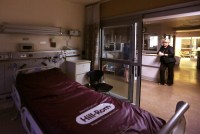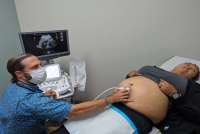Latest KFF Health News Stories
Journalists Sum Up the Costs to Patients of New Weight Loss Drugs and Hospital Mergers
KFF Health News and California Healthline staff made the rounds on national and local media this week to discuss their stories. Here’s a collection of their appearances.
Your Exorbitant Medical Bill, Brought to You by the Latest Hospital Merger
After decades of unchecked mergers, health care is the land of giants, with huge medical systems monopolizing care in many cities, states, and even whole regions of the country. This decreases patient choice, impedes innovation, erodes quality of care, and raises prices. And federal regulators have been slow to act.
As a Union Pushes to Cap Hospital CEO Pay, It’s Accused of Playing Politics
A union is asking Los Angeles city voters to cap hospital executive pay at the U.S. president’s salary. However, hospitals accuse the union of using the proposal as political leverage, and policy experts question whether the policy, if enacted, would be workable.
What One Lending Company’s Hospital Contracts Reveal About Financing Patient Debt
Within two years of North Carolina’s public university system going into business with AccessOne to finance patients’ payment plans, nearly half of its patients were in loans that charged interest. As federal scrutiny increases on lenders, KFF Health News is sharing that contract and others obtained through public records requests.
Look Up Your Hospital: Is It Being Penalized by Medicare?
Each year, Medicare punishes hospitals that have high rates of readmissions and high rates of infections and patient injuries. Check out which hospitals have been penalized.
Journalists Explore Shortage of Foster Care Sites and Prevalence of Covid Misinformation
KFF Health News and California Healthline staff made the rounds on national and local media this week to discuss their stories. Here’s a collection of their appearances.
His Anesthesia Provider Billed Medicare Late. He Got Sent to Collections for the $3,000 Tab.
Medicare was supposed to cover the entire cost of his procedure. But after the anesthesia provider failed to file its claims in a timely manner, it billed the patient instead.
Bankrupt California Hospital Receives Lifeline From Adventist, Report Says
The Fresno Bee reports that Madera Community Hospital has reached an agreement with Adventist Health to take over the bankrupt facility and avoid liquidation.
Home Sweet Parking Lot: Some Hospitals Welcome RV Living for Patients, Families, and Workers
Medical and RV industry professionals say hospitals that offer RV parking are easing access to health care for some patients who drive long distances for treatment, like many rural residents.
Hospitals Ask Congress to Delay ACA Medicaid Funding Cuts — For the 14th Time
Congress has until October to avert cuts to a Medicaid program intended to support safety-net hospitals that, in practice, improves the bottom lines of other hospitals, too. Hospital leaders say now is not a good time for the cuts — which lawmakers have so far postponed 13 times.
Giant Health System Almost Saved a Community Hospital. Now, It Wants to ‘Extract Every Dollar.’
A bankruptcy judge will soon decide whether a Central Valley hospital needs to liquidate to repay its creditors. Its largest creditor, St. Agnes Medical Center, is the very entity that backed out of purchasing the Madera Community Hospital last December.
Un sistema de salud gigante casi salvó a un hospital de Madera. Ahora quiere “sacarle cada dólar”
Problemas como el de Madera son comunes en otros hospitales pequeños con situaciones financieras precarias en California, y en todo el país.
Medical Debt Is Making Americans Angry. Doctors and Hospitals Ignore This at Their Peril.
Doctors and hospitals hold an exalted position in American life, retaining public confidence even as other institutions such as government, law enforcement, and the media are losing people’s trust. But with health care debt out of hand, medical providers risk their good standing.
Doctors Created a Primary Care Clinic as Their Former Hospital Struggled
With the community’s help, former co-workers came together to fill gaps in care left by the loss of doctors and departments at a Gallup, New Mexico, hospital.
A Mom Owed Nearly $102,000 for Hospital Care. Her State Attorney General Said to Pay Up.
As politicians bash privately run hospitals for their aggressive debt collection tactics, consumer advocates say one North Carolina family’s six-figure medical bill is an example of how state attorneys general and state-operated hospitals also can harm patients financially.
As Nonprofit Hospitals Reap Big Tax Breaks, States Scrutinize Their Required Charity Spending
Nonprofit hospitals avoid paying taxes if they provide community benefits such as charity care. More states are examining that trade-off, scrutinizing the extent of hospitals’ spending on their communities.
The Hospital Bills Didn’t Find Her, but a Lawsuit Did — Plus Interest
Recovering from emergency gallbladder surgery, a Tennessee woman said she spent months without a permanent mailing address and never got a bill. She was sued by the health system two years later.
What One Hospital’s Slow Recovery From a Cyberattack Means for Patients
U.S. hospitals have seen a record number of cyberattacks over the past few years. Getting hacked can cost a hospital millions of dollars, expose patient data, and even jeopardize patient care.
International Rights Group Calls Out US for Allowing Hospitals to Push Millions Into Debt
In a new report, Human Rights Watch urges stronger federal and state action to hold hospitals to account for a medical debt crisis that now burdens more than 100 million Americans.
Will a ‘National Patient Safety Board,’ Modeled After the NTSB, Actually Fly?
A push is underway to create a National Patient Safety Board modeled after the National Transportation Safety Board, an independent federal agency that investigates plane crashes and other transportation disasters. But unlike the NTSB, some patient safety advocates say, the current proposal is toothless and wouldn’t provide transparency about the nation’s hospitals.
























